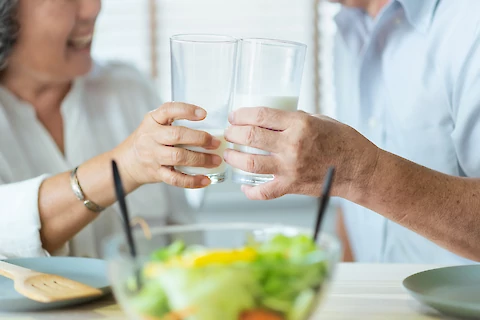
7 Best Sources of Calcium to Add to Senior Diets
Remember those commercials aimed at kids that talked about calcium for growing healthy bones and teeth? They may as well have targeted seniors—as you age, your body needs more calcium to keep your bones and teeth healthy. Calcium does a lot more for your body, however; it also has an important role to play in blood clotting, muscle contraction, and regulating heart and nerve function. If you don't get enough calcium, you're also at risk for high blood pressure. So how can seniors know how much calcium they need? And what are the best sources of calcium to add to a senior's diet?
Micronutrients and a Healthy Diet
Micronutrients are the minerals your body needs in small amounts, but are critical to maintaining good health. These can include calcium, Vitamin D, magnesium, potassium, and Vitamins C and K. Seniors can get all these micronutrients with a balanced diet that's heavy on fruits and vegetables.
Best Sources of Calcium
The benchmark for adults over 70 is 1,200 mg per day, although a senior's doctor may recommend more.
1. Dairy Products
Milk and milk products— cheese, yogurt, ice cream— are the best sources of calcium, but seniors can also get their daily dose with calcium-fortified beverages such as soy, oat, or almond milk. Dairy products from sheep and goats are also high in calcium.
If lactose is a problem, there are plenty of low-sugar options that do have lots of calcium. Seniors can also try kefir instead of milk.
2. Dark Green, Leafy Veggies
Broccoli, turnip and collard greens, bok choy, collards, and kale are all great sources of calcium. Winter squash is also a good option. Spinach is not a great source as the chemistry of the leaves makes it difficult for the body to absorb. Seniors may think that raw veggies have more nutritional benefits, but cooking these greens yields at least double the calcium.
3. Fruits
Citrus fruits—oranges and tangerines—are highest in calcium, but kiwi, prickly pears, guavas, passion fruit, and papayas are also good bets. Blackberries and mulberries are also loaded with calcium.
4. Dried Legumes
White beans—navy, cannellini, and Great Northern varieties—and lentils are particularly high in calcium. Darker beans—kidney and black beans—are not as high in calcium, but have enough other micronutrients that they should be part of your diet, too.
5. Fish with Soft Bones
Salmon and sardines are good sources of calcium, and they're also high-protein omega-3 foods that promote heart health.
6. Fortified Cereals and Juices
Plenty of breakfast cereals are calcium-enriched, so combined with milk or a fortified milk substitute, these are a great start to a senior's day. Orange juice is naturally high in calcium but is often fortified for an extra boost. Seniors can also try calcium-enriched tofu to help meet their daily requirements.
7. Odds and Ends
Seniors can also snack on almonds and seeds (chia, celery, sesame, and poppy) to round out their calcium intake. Blackstrap molasses eaten with oatmeal also has lots of calcium.
Seniors Helpers Can Help Meet a Senior's Daily Nutritional Intake
Seniors who can't get enough calcium from their diet should consult their healthcare provider for advice on supplemental calcium.
Senior Helpers of South Minneapolis can help seniors in Saint Paul, Minneapolis, Minnetonka, and Hennepin County, make sure they have a balanced diet that contains enough calcium, vitamin D, and other micronutrients. We offer a full range of in-home care services, from companionship to live-in assistance.
Contact us to learn more about our services.